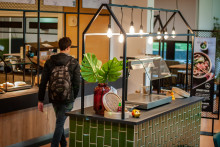The Working Group on Development Techniques (WOT) has succeeded in developing an injection mould that can be used to combat the waste problem in developing countries. The machine also contributes to the water supply and poverty control.
The idea came from Johan Sueters, a retired mechanic and volunteer at the WOT. Ten years ago, he visited his daughter in Senegal and noticed the amount of plastic garbage. `In African supermarkets, almost every article is wrapped separately in plastic,' Sueters explains. `That produces a lot of waste, which is never processed.' Back home, he turned to the WOT. WOT Member Freddy Alferink: `Johan wanted to know if we could develop a simple waste processor, an injection mould. This was the ultimate challenge for our working group. By processing waste at a small scale, you can stimulate local economy. The conditions were that the machine should be simple, inexpensive, and able to work without electricity.'
And so WOT accepted the challenge of designing a machine that is easy to deploy and can be built with local resources. The end result, after almost ten years of brainstorming, designing and improving, is a screwing injection mould that can melt plastic and, using a screw, pump it into a mould. `The challenge was to omit as many extras as possible. The injection moulds used in the Netherlands are way too modern for use in developing countries.' The prototype produces pistons for rope pumps, a type of water pump that is becoming increasingly common in developing countries.
Sueters and Alferink proudly show the screwing injection mould in the WOT workshop. `Look, this is where the granulate, the plastic balls, go in', Sueters points. `The plastic is melted by heating and pressed in the shape of a piston. The machine can produce three pistons per minute.'
The ROC in Enschede is currently reviewing the plans for the machine. Alferink: `They are checking them for any mistakes. After that, we will make the material available to developing countries.'
The plans and detailed drawings have been published on the internet: www.wot.utwente.nl/documents/description/2005_extruder/index_nl.html. The descriptions are currently in Dutch only, but Vico Beerenpoot is working with another volunteer to produce an English version. `This information will be published on CD-ROM and sent to our local contacts. They will distribute the information to the right people.'







